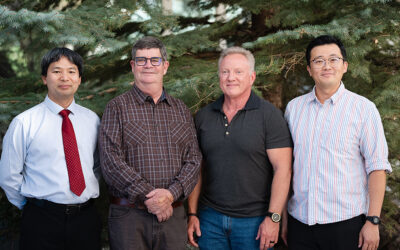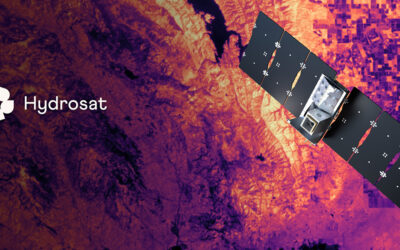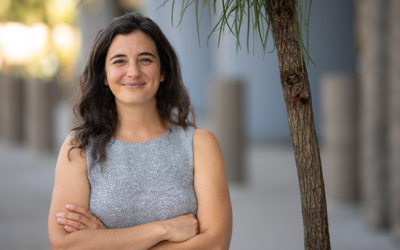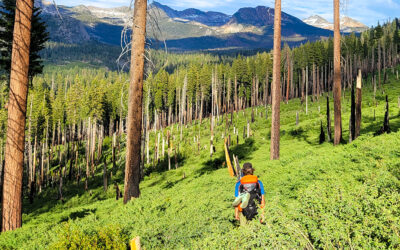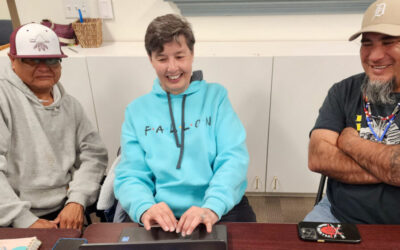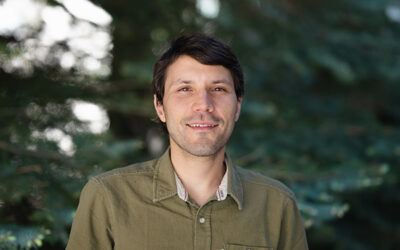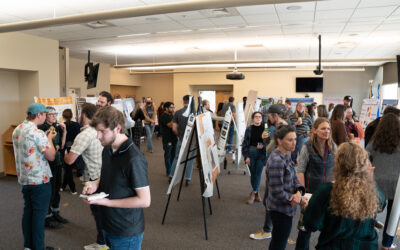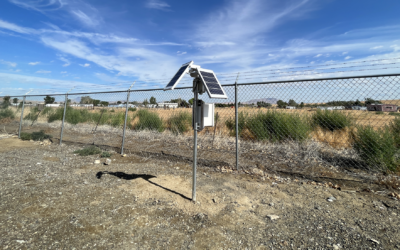DRI’s annual awards and recognition ceremonies were held at our Reno and Las Vegas campuses in early October to honor scientists and staff members for their achievements. Along with the below awardees, several faculty and staff were recognized for their long-term service to the institute. DRI prides itself on fostering a fulfilling workplace that builds internal community and inspires scientific discovery.
Measuring Colorado River Evaporation from Reservoirs
DRI is advancing water management in the Colorado River basin with support from the National Science Foundation’s Southwest Sustainability Innovation Engine (SWSIE) and the Governor’s Office of Economic Development. Partnering with Hydrosat, DRI uses high-resolution satellite thermal imaging to enhance evaporation estimates from key reservoirs, ensuring better resource planning amidst drought and population growth.
Meet Monica Gehrig
Monica Gehrig joined DRI in summer 2023. She works with the STEM Education Program to bring science education to Nevada schools and builds partnerships with organizations like the Atomic Museum and the Southern Nevada Water Authority. Born and raised in Louisiana, she is now based at DRI’s Las Vegas campus. In this interview, Gehrig shares her passion for science education and why she considers it central to understanding the world, her circuitous path to DRI, and her many hobbies outside of work.
DRI Recognizes Catherine Ivanovich as the 2024 Peter B. Wagner Memorial Award Winner for Women in Atmospheric Sciences
DRI is pleased to announce that the 26th annual Peter B. Wagner Memorial Award for Women in Atmospheric Sciences has been awarded to Catherine (Casey) Ivanovich of Columbia University. The Peter B. Wagner Memorial Award for Women in Atmospheric Sciences is an annual competition recognizing the published works of women pursuing a master’s or Ph.D. in the atmospheric sciences.
Meet David Almanza
David Almanza, Ph.D., joined DRI this summer as a postdoctoral researcher in urban climate adaptation. He is working with Ariel Choinard in the Southern Nevada Heat Resilience Lab to examine how heat is impacting communities in and around Las Vegas. Born in Bogota, Colombia, Almanza grew up in Las Vegas and completed his Ph.D. at the University of Nevada, Las Vegas, in 2023. In this interview, Almanza discusses his social science training, what it means to center research on your own community, and his love for Las Vegas eateries.
Tracking the Restorative Effects of Good Fire
A few miles south of Yosemite’s famed Glacier Point, ringed by striking granite domes, lies the Illilouette Basin. This small stretch of the Sierra Nevada Mountains has become a sort of fire laboratory, a place where natural wildfires have been allowed to burn since 1972. In contrast with the long-supported program of fire suppression that has dominated American forests since the late 19th century, resulting in dense and unhealthy forests, the Illilouette Basin’s story is about the benefits that natural fire can bring to the landscape.
Native Climate Team Holds Indigenous Education Workshop
The Desert Research Institute’s Native Climate education team, Ileah Kirchoff and Crystal Miller, hosted a collaborative workshop between the Walker River Paiute Tribe and the Fallon Paiute Shoshone Tribe on May 4, 2024. The session focused on Indigenous curriculum development and the incorporation of Traditional Ecological Knowledge (TEK), particularly in lessons about the climate crisis.
Meet Juan Henao Castaneda
Juan Henao, Ph.D., is a new postdoc in atmospheric sciences working with John Mejia, Ph.D. Originally from Medellin, Colombia, he spent six months on DRI’s Reno campus in 2018 while working with Mejia during his doctoral studies. His primary project will be contributing to atmospheric and air quality modeling efforts, including using digital twins to investigate the effectiveness of urban heat mitigation measures.
Graduate Student Winners of the Annual Poster Presentation Session
On Friday, April 26th, 16 graduate students presented their research at DRI’s Reno campus for the annual poster presentation session. Organized by Kathleen Rodrigues, PhD, assistant research professor of luminescence, the poster session offers an opportunity for DRI-affiliated graduate students to network with each other and with DRI faculty, hone their presentation skills, and showcase the research they’re working on in pursuit of their degrees.
DRI Researchers Partner with NDEP to Prepare Rural Nevada Communities for a Smokier Future
In 2021, DRI researchers partnered with the Nevada Division of Environmental Protection (NDEP) to address the gap in air quality monitoring. Led by Kristin VanderMolen, Ph.D., assistant research professor of atmospheric science, a new study details how the research team designed custom air quality sensors and information materials for rural Nevada counties.
